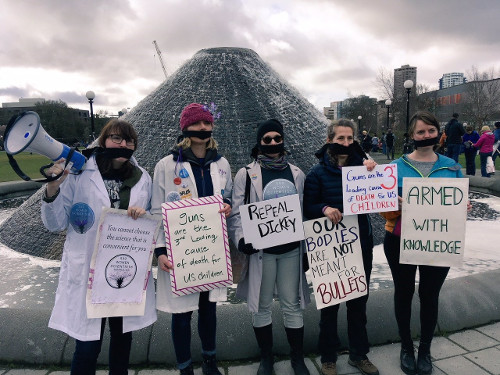SUBSCRIBE TO THE FREE NEWSLETTER
Cascadia Magazine original: Why women, why science, why now?
Sarah E. Myhre is a paleoceanographer at the University of Washington and unapologetic defender of women’s rights — especially in the STEM field (science, technology, engineering, and mathematics). In a hard-hitting essay for Cascadia Magazine, Myhre writes about how women scientists in Seattle are helping create a global movement for justice, equity, and science-based policy.
Myhre talks about the creation of 500 Women Scientists, and how they’ve become politically active in movements ranging from climate justice to gun violence. And she speaks with Sapna Cheryan, a professor of psychology at the University of Washington who’s studying the ways women are excluded from STEM fields.
She quotes Cheryan: “Privilege is not inherently bad—it doesn’t mean that you are a bad person, but it should obligate you to act on behalf of others.”
Read the full article online at Cascadia Magazine.
Cascadia Magazine’s Almost Summer Reading, Friday June 1
Join us for our first public event! Cascadia Magazine’s Almost Summer Reading features poets, fiction writers, and journalists published in Cascadia Magazine reading from and talking about their work. It’s free, so grab a cool beverage and listen to some fantastic writing from Donna Miscolta, Anca Szilágyi, Montreux Rotholtz, Michael Schmeltzer, Daniel Hawkins, Niki Stojnic, and Matt Stangel.
6:30 – 8 p.m., Friday June 1
Vermillion on Seattle’s Capitol Hill, 1508 11th Ave.
British Columbia to vote in proportional representation
British Columbia will vote by mail this fall on whether the province will switch to a proportional representation model of elections, says The Star Vancouver. In addition toa yes/no vote, the ballot will also offer three distinct choices of systems. CBC has an analysis of the three systems and wonders if voters will be overwhelmed, while Sightline Institute has a detailed analysis, and notes that New Zealand took a similar two-step process when it passed proportional representation in the 1990s.
BC premier and WA governor voice opposition to pipeline purchase
Writing for McLean’s, British Columbia premier John Horgan spells out why his government is opposed to the Canadian government purchasing and expanding the Trans Mountain pipeline: “It’s not about politics. It’s not about trade. It is about British Columbians’ right to have their voices heard.” Washington governor Jay Inslee also expressed opposition to a new pipeline that would increase tanker traffic in the Salish Sea seven times over and threaten orca recovery. Alberta premier Rachel Notley, meanwhile, insisted her province needs the new pipeline, which would be built almost exclusively in Cascadia.
How will Portland’s brick buildings fare in a megaquake?
Kelly Kenoyer, writing for the Portland Mercury, investigates what might happen to the 1,650 “URM” (un-reinforced masonry) buildings in Portland in a big earthquake — geologists worry it could be much worse than the 2011 Christchurch New Zealand earthquake, which left only 14 percent of URMs standing.
Oregon’s recycling ending up in landfills
The New York Times reports on how changes to China’s regulations on imported recycling materials has had a profound impact on Oregon’s recycling programs, with one company diverting as much as 2,000 tons of paper to landfills.
Vermillion celebrates 10 years on Seattle’s Capitol Hill
City Arts has a great profile of Diana Adams, owner of Seattle’s Vermillion gallery and bar, which celebrates its ten-year anniversary this Friday. “It’s become way more of an institution than just a simple wine bar with a gallery in it. People say it’s become a cultural hub. I’m proud of that.” It also happens that Vermillion will be hosting Cascadia Magazine’s very first public reading that same evening at 6:30, Friday, June 1. We’re honored to be a part of the evening’s festivities!
“Kibo’s Cats,” fiction by Sharon Hashimoto
Over at Moss, you should definitely set aside time to read “Kibo’s Cats,” a beautifully sad story by Sharon Hashimoto, who lives in Seattle and teaches at Highline Community College in Des Moines. “All the way home from Tuck’s Auto Repair, Alice pointed out the new buildings. Seattle was getting bigger. High rise apartments and condos were springing up all along the light rail line. Restaurants like Ichiban were gone. So was the old variety store with cheap fishing supplies, cheap tennis shoes, cheap everything….”
That’s all the news & arts from Cascadia today. –Andrew Engelson
Photo credits: women scientists at Seattle March for Our Lives courtesy Sarah E. Myhre

